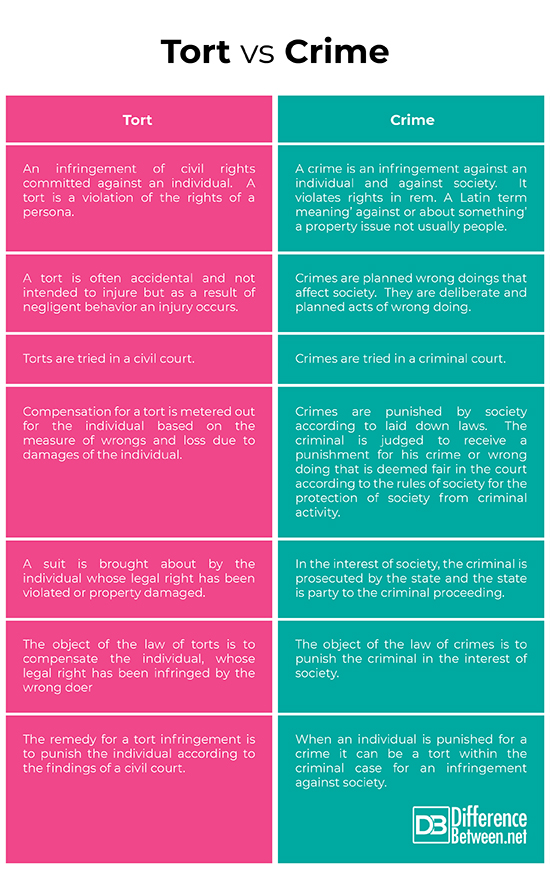Difference Between Tort and Crime
A tort and a crime are technical terms used in the legal world. The word crime is more commonly understood as crimes are newsworthy events and reach headlines. They affect the society we live in.
A tort differs from a crime because although it is a wrong doing it is classified as a civil offense. A tort interferes with another person or their property.
A crime on the other hand, is a wrong doing that affects civilized society and falls under the laws of the state or federal government.
Torts and crimes are tried in different courts and although both accused parties are known as defendants the charges of a tort are laid by a plaintiff while crimes are brought to court by the federal government.
A tort may well be part of a crime as some personal injury may occur to innocent parties during the crime. Crimes are tried in a criminal court while torts are brought to justice through a civil court.
Crimes are identified by the legal system as acts that go against society. Torts are based on injury to individuals due to negligence or personal damage.
Understanding the basic principles of each action helps to understand the differences between them. Torts appear to be smaller events compared with the larger scale of organized crime.

What is a Tort?
A tort is best defined as a private infringement on someone’s civil rights. In legal terms a tort occurs when negligence directly causes damage to a person or their property.
There are different types of tort, but they all result in injury to a private person or property. Negligence is the most common cause of a tort.
When a person acts without care and unintentionally injures someone the injured party may sue and accuse the defendant of a tort. Strict liability torts become an issue if a private party is injured through the attack of an animal or faulty product. These unintentional acts cause damage to a person’s health or their property. Intentional torts occur when an individual intentionally causes harm to another person. These injuries could be the result of battery or defamation of character. The injured party may sue for loss of income as a result of the tort or for damages to property due to negligent behavior.
Intentional torts can be confused with crime because they often happen during criminal activity. If the injured party decides to sue for compensation, then the criminal case becomes a tort. The perfect examples of a tort can be seen in motor vehicle accidents, cases of slipping and falling, medical malpractice, assault, product liability and workplace accidents. A tort that is part of a criminal activity is evident when someone driving under the influence of alcohol or drugs causes bodily harm to another individual involved in the accident. The crime is described as the way the guilty party drove, and the tort is the injury sustained by a private individual. Therefore, it is clear to see the role of a tort in a situation violating the safety and health of an individual during the course of what is classified as a crime.
A tort is unlawful because –
- A tort causes bodily harm or psychological injuryto an individual and impairs a person’s lifestyle.
- A tort goes against the civil rights of an individual in society.
- Torts are covered by law and the offence can be prosecuted, but the outcome will differ based on the legal guidelines serving the law and civil rights.

What is a crime?
A crime is a wrong doing that affects society. It has been identified by the state legal system and is prosecuted according to the laws of the state and the procedure followed in a criminal court of law.
The injured party is classified as the society and the laws broken have been set up by the state or federal government to protect the members of society.
The proceedings that are used to bring about justice take place in a criminal court of law. The punishment will fit the crime under criminal law and the defendant will serve the sentence given to him through the criminal court of law.
Crimes go against laws that are already set for the protection of society and to keep peace ensuring everyone can have the right to live in a crime free society, in an ideal world!
Sometimes the punishment involves community service as a means to put right the wrong committed at the time and help reform individuals.
Crimes are illegal acts for the following reasons.
- Crimes go against existing laws laid down in society.
- Crimes affect the standard of living for law-abiding citizens who wish to live peacefully in their social environment.
- A crime is a deliberate act going against the law and contravening human rights.
Difference between Tort Vs. Crime
-
Method
A tort is a wrong doing that goes against an individual, while a crime affects the social order of the community we live in.
-
Intent
The intent of a tort can be unintentional, it is accidental and caused by negligence. It is still damaging to the individual. A crime is an intentional wrong doing that affects society. Individuals may be caught up in the crime and suffer during the criminal activity, but generally the crime and criminals break the law and intend to gain from the wrong doing.
-
Effect on society
Torts and crimes affect society in different ways, but the impact is negative. A tort upsets the well being of an individual and they may seek legal action and compensation. A crime affects society and the criminal law will ensure the perpetrators are punished for their crimes. Sometimes, torts and crimes can be inter-twined in the same criminal activity. An individual, on the scene of the crime, could be injured because of the criminal activity.
Tort versus Crime

Summary of Tort versus Crime
- A tort affects an individual and causes damage to individuals leading to loss of income or damage to property. Crimes are planned actions that deliberately go against the laws of society and can be executed by individuals or groups of criminals.
- Crimes and torts influence the well being of the people who suffer at the hands of the perpetrators. It may be accidental in the case of a tort, but in the end, the result is still negligent and harmful to individuals or to society.
- A tort and a crime are acts against humanity one defined by the effect on an individual and the other defined by the effect to society.
- Torts generally appear to be less damaging and often accidental or just negligent and not deliberate. Occasionally torts are planned actions that are harmful, but because they are felt more often by an individual, and may even be accidental, they are not as hazardous to society and can be dealt with differently. Sometimes torts can be resolved between the individual parties involved in the wrong doing and this saves legal proceedings.
- Difference Between Lagoon and Bay - October 20, 2021
- Difference Between Futurism and Preterism - August 12, 2021
- Difference Between Dichotomy and Paradox - August 7, 2021
Search DifferenceBetween.net :
2 Comments
Leave a Response
References :
[0]Prajual Poojaru. What is the difference between Tort and Crime? www.shareyouressays.com./knowledge/what-is-the-difference. reviewed 18/08/2018
[1]Legal-news-/personal injury – 2/ tort-or-crime.www.injurylawcolarado.com Sept 14/2017 Babcock law firm. Review 18/08/2018
[2]Six key differences between Tort Law and Criminal Law cases/www.thelawdictionary.com pub Blacks Law Dictioary 2nd edition/reviewed 18/08/2018.
[3]Image credit: https://www.pexels.com/photo/crime-scene-do-not-cross-signage-923681/
[4]Image credit: http://www.thebluediamondgallery.com/handwriting/images/tort.jpg

Need case law that brings out the difference!!
Good article/post on Difference between Tort Vs. Crime.